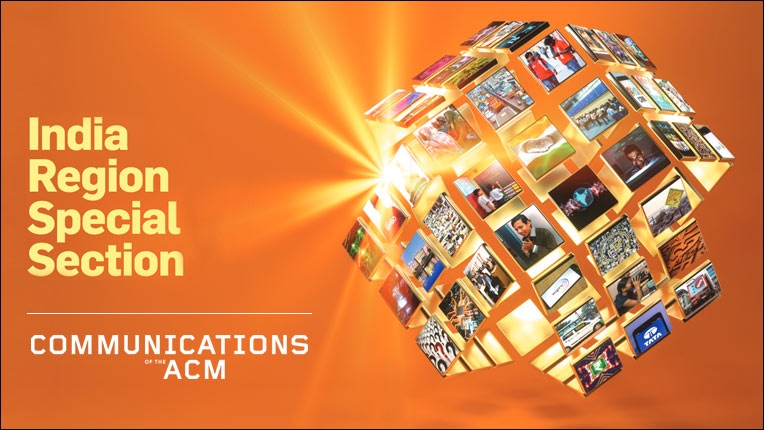Communications of the ACM Regional Section on India Region
Communications of the ACM Regional Section on India Region
The second India Region Special Section is featured in the November 2022 issue of Communications of the ACM (CACM), It has a collection of articles on the area’s substantial presence in the computing field, from theoretical computer science to hardware and computer architecture, data science and cybersecurity, and more, all by authors from the subcontinent. You can find the articles clearly marked with "India Region Special Section."
The section's guest editors—Hemangee Kalpesh Kapoor, Mausam, and Venkatesh Raman—discuss the report and its articles in a video at https://bit.ly/3VOvXN2.
The following text has been retained temporarily for reference.
Submission Date Extended to 25th February, 2022
Communications of the ACM (CACM), the flagship magazine of the Association for Computing Machinery, publishes regional special sections to cover computing research and innovations from around the world, with roughly one such section published every quarter. The first regional section on China was published in November 2018, followed by special regional sections on the EU, East Asia and Oceania, and on India which appeared in November 2019.
Communications of the ACM Regional Section on India Region 2022 CFP
2022 is a second round of opportunity for the India Region which covers countries like India, Pakistan, Bangladesh, Sri Lanka, Nepal, Bhutan and Myanmar.
This is a wonderful opportunity to tell the world about the unique and influential activities happening in the India Region that may not be easily known outside or inside the region. We invite researchers, computing practitioners in industry and startups, and government professionals to contribute articles that are of broad relevance. The articles may include scientific research highlights, technology innovations, recent policy changes, and computing surveys relevant to the India region. Topics of interest include, but not limited to:
- CS research highlights: important CS research undertaken in the past 5 years or so. Research areas span a broad range of theory, AI and systems. Research with high academic or societal impact—either actual or potential— will be natural candidates. Articles with a theme that has special relevance are likely to be more suitable than those presenting narrow research results.
- Applications to Other Areas: Computing has been increasingly playing the role of an enabler in a wide variety of broad applications. Articles highlighting innovations and successes are very welcome. These include, but are not limited to:
- Societal impact using technology: The region is home to a large number of societal challenges in all areas: health, education, housing, poverty, etc. Examples of making a significant impact to broad society or the lesser developed parts of the region through the use of computing should be of interest to the global audience.
- Education and service industry: Significant efforts related to services, or important education efforts with interesting computing aspects.
- Banking and financial systems: Important financial institutions and large groups of consumers operate within the region. Description of innovative projects with interesting computing aspects are welcome.
- Sciences and Humanities: Use of computing systems to solve problems in areas of engineering, sciences, medicine and humanities.
- Government and digital technology: As part of the latest development and also due to the pandemic, a number of initiatives which use computing technologies have been started by the government, and in this way the population is empowered. Experiences and learning from these efforts will be ideal to be featured in the section.
- Diversity and Inclusion: Computing technologies benefitting minority communities by promoting regional, gender and institutional diversity and inclusion.
- Surveys focused on India region: Articles that survey some topic related to computing infrastructure or impact (e.g., internet penetration, supercomputing infrastructure) in the India region.
- Reports on computing activities: Descriptions and reports on prestigious and traditional regional conferences, schools, and other research related activities.
- Challenge Papers and Position Papers: We also invite thought-provoking papers from experts, highlighting limitations or weaknesses of the current state of computing research or policy or technology, with associated recommendations for the way forward.
- Other topics: Anything else about computing in the region that could be relevant to the CACM audience, and not covered above, such as emerging technologies, sustainable development, climate changes and energy.
If you think you can contribute to this effort, please prepare a short 500 words abstract on your topic of interest along with pointers to sources that can provide more details. The abstract should explicitly highlight the impact and importance of the work in the broad industrial, academic, or societal context. The abstract should also mention the theme about which you are submitting the article.
Please submit your abstract as a single PDF file through the Easychair Submission Portal on or before February 25, 2022. Your abstract will be reviewed by a team of experts and if shortlisted you will be invited for a 10-min presentation at the (virtual) workshop that is being planned for 23rd and 24th March 2022. Authors of selected submissions from the workshop will be invited to submit a full version (up to 2500 words) of their articles for further review. The final articles selected by the team of experts will feature in the India Region Section of CACM.
For queries, please write to: [email protected]
Hemangee K. Kapoor, Indian Institute Technology, Guwahati
Mausam, Indian Institute Technology, Delhi
Venkatesh Raman, The Institute of Mathematical Sciences, Chennai
(Co-chairs, CACM Regional Special Section on India Region)
Workshop on CACM Regional Section on India 2022
Communications of the ACM, the flagship magazine of ACM, is planning a special issue focused on computing in the India region to be published later in 2022. Join a virtual workshop on 23-24 March 2022 featuring presentations on abstracts that are expected to appear in the special issue. All are welcome to attend.
